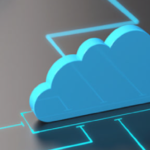What is cloud computing?
Cloud computing is renting resources, like storage space or CPU cycles, on another company's computers. You only pay for what you use. The company providing these services is referred to as a cloud provider. Some example providers are Microsoft, Amazon, and Google.
The cloud provider is responsible for the physical hardware required to execute your work, and for keeping it up-to-date. The computing services offered tend to vary by cloud provider. However, typically they include:
- Compute power - Linux servers or web applications used for computation and processing tasks
- Storage - Files and databases
- Networking - Secure connections between the cloud provider and your company
- Analytics - Visualizing telemetry and performance data
Copy
The three verticals, virtual machines, containers, and serverless, show different architectures. Virtual machines starts at physical hardware and has layers built on it: host operating system, hypervisor controller, and then two virtual machines on top with one running Linux and two apps and one running Windows and two apps. Containers starts with physical hardware with additional layers: host operating system, container engine, and then three containers, each with their own dependencies and hosted apps. Serverless starts with physical hardware with additional layers: host operating system, serverless runtime, and then eight functions.
The cloud provider is responsible for the physical hardware required to execute your work, and for keeping it up-to-date. The computing services offered tend to vary by cloud provider. However, typically they include:
Storage
Most devices and applications read and/or write data. Here are some examples:
• Buying a movie ticket online
• Looking up the price of an online item
• Taking a picture
• Sending an email
• Leaving a voicemail In all of these cases, data is either read (looking up a price) or written (taking a picture). The type of data and how it's stored can be different in each of these cases.


Cloud providers typically offer services that can handle all of these types of data. For example, if you wanted to store text or a movie clip, you could use a file on disk. If you had a set of relationships such as an address book, you could take a more structured approach like using a database.
The advantage to using cloud-based data storage is you can scale to meet your needs. If you find that you need more space to store your movie clips, you can pay a little more and add to your available space. In some cases, the storage can even expand and contract automatically - so you pay for exactly what you need at any given point in time.
Summary
Every business has different needs and requirements. Cloud computing is flexible and cost-efficient, which can be beneficial to every business, whether it's a small start-up or a large enterprise.


